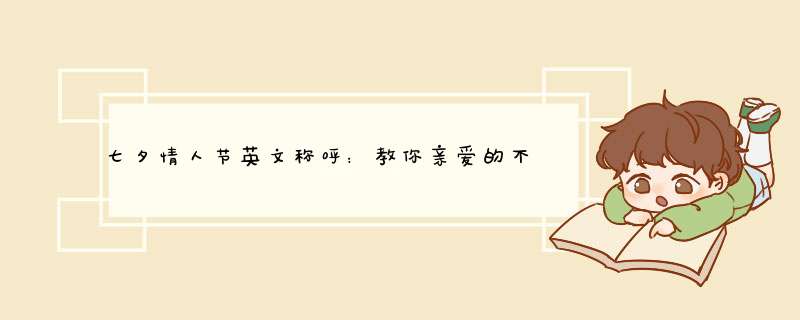
Dear使用的范围比较广。可以用来称呼朋友,也可以用来称呼亲密爱人,也有可能是长辈称呼小辈。另外英语日记通常会用 dear 开头。写信时通常的称呼也是 Dear XX。
经典美剧老友记第一季第8集中,Ross和Monica的奶奶去世后,Ross在家里收拾东西,他和他妈妈有这么一段对话,Ross就被妈妈叫做dear:
Ross: Oh my God
Mrs Geller: Is everything all right, dear
Ross: Yeah, just just Nana stuff
Honey, Darling 和 Baby 都是“亲爱的”比较常见的表达。
例句:
I love you, honey
Darling, would you please wait a second
When my girlfriend started calling my best friend "baby", I knew it was over
Honey 也会写成hunny 或者 hunnie,表示的都是“亲爱的”。
说到这里就想到《海角七号》的插曲《爱你爱到不怕死》:“Honey darling baby,或是叫我的小亲亲,只要哄我高兴,冥王星都陪你去。”
Sweetheart
亲爱的、可爱的、喜欢的都可以成为sweetheart,另外口语上表示友善的称呼也可以用sweetheart。就像现在很多女生之间喜欢互称“亲爱的”。
例句:
I like Joaquin, he's a real sweetheart 我喜欢杰昆,他真是个甜心。
What can I get you, sweetheart 甜心,我能为你拿点什么?
《老友记》第一季感恩节篇:
Terry: Rachel, Rachel, sweetheart You're a terrible, terrible waitress Really, really awful
Sweetie
sweetie可以称呼亲密爱人也可以称呼亲密友人,也可用于长辈称呼晚辈的情况。
例句:
Goodnight now sweetie, I'll miss you so much but I'll see you next week! 亲爱的,晚安了,我会非常想你的不过要到下周才能见到你!
美剧《识骨寻踪》中,Angela经常叫女主角Brennan Sweetie。
Sweetums
I love talking to my sweetums He rocks my face off 我喜欢和亲爱的他聊天,他让我开心极了。
《哈利波特与密室》:
"I want more bacon" "There's more in the frying pan, sweetums," said Aunt Petunia
Pumpkin
老外好像对南瓜有种特别的感情,这个词也可以表示亲爱的,宝贝儿这样的含义。
《成长的烦恼》第三季第10集:
Maggie: Pumpkin, you just had your tonsils out!
New Ben: But
Maggie: For me
Pumpkin 在口语里也可以说成 Pumkin。
Me and my Pumkin are heading to a movie, wanna come 我和我男(女)朋友要去看**,一起来吗?
Boo
据说是黑人圈的俚语用法,可以用做男朋友或者女朋友的称呼,也可以表示亲爱的。
Can you handle me If you can't you ain't gonna be my boo 你能搞定我吗?如果你不行可当不了我男朋友。
除了这些称呼之外,看过《绯闻女孩》的朋友们一定知道,写信的时候表示亲密,可以在后面加个“XOXO”,表示抱抱亲亲。你还知道其它表示亲密的词吗?
七夕将至,你知道关于七夕节的英文介绍吗下面我精心整理了关于七夕节的英文介绍的相关资料,希望可以帮到你!
关于七夕节的英文介绍
The Double Seventh Festival, on the 7th day of the 7th lunar month, is a traditional festival full of romance It often goes into August in the Gregorian calendar
This festival is in mid-summer when the weather is warm and the grass and trees reveal their luxurious greens At night when the sky is dotted with stars, and people can see the Milky Way spanning from the north to the south On each bank of it is a bright star, which see each other from afar They are the Cowherd and Weaver Maid, and about them there is a beautiful love story passed down from generation to generation
Long, long ago, there was an honest and kind-hearted fellow named Niu Lang (Cowhand) His parents died when he was a child Later he was driven out of his home by his sister-in-law So he lived by himself herding cattle and farming One day, a fairy from heaven Zhi Nu (Weaver Maid) fell in love with him and came down secretly to earth and married him The cowhand farmed in the field and the Weaver Maid wove at home They lived a happy life and gave birth to a boy and a girl Unfortunately, the God of Heaven soon found out the fact and ordered the Queen Mother of the Western Heavens to bring the Weaver Maid back
With the help of celestial cattle, the Cowhand flew to heaven with his son and daughter At the time when he was about to catch up with his wife, the Queen Mother took off one of her gold hairpins and made a stroke One billowy river appeared in front of the Cowhand The Cowhand and Weaver Maid were separated on the two banks forever and could only feel their tears Their loyalty to love touched magpies, so tens of thousands of magpies came to build a bridge for the Cowhand and Weaver Maid to meet each other The Queen Mother was eventually moved and allowed them to meet each year on the 7th of the 7th lunar month Hence their meeting date has been called "Qi Xi" (Double Seventh)
Scholars have shown the Double Seventh Festival originated from the Han Dynasty (206 BC-AD220) Historical documents from the Eastern Jin Dynasty (AD371-420) mention the festival, while records from the Tang Dynasty (618-907) depict the grand evening banquet of Emperor Taizong and his concubines By the Song (960-1279) and Yuan (1279-1368) dynasties, special articles for the "Qi Xi" were seen being sold on markets in the capital The bustling markets demonstrated the significance of the festival
Today some traditional customs are still observed in rural areas of China, but have been weakened or diluted in urban cities However, the legend of the Cowhand and Weaver Maid has taken root in the hearts of the people In recent years, in particular, urban youths have celebrated it as Valentine's Day in China As a result, owners of flower shops, bars and stores are full of joy as they sell more commodities for love
七夕吃鸡原因
为了表达人们希望牛郎织女能天天过上美好幸福家庭生活的愿望,在浙江金华一带,七月七日家家都要杀一只鸡,意为这夜牛郎织女相会,若无公鸡报晓,他们便能永远不分开。
传说中牛郎织女,每年只有在七夕,才得以鹊桥相会;而当雄鸡报晓时,他们就不得不分开了。古时人们因为同情牛郎织女,有流行在七夕宰鸡的风俗,以祈祷有情人永不分离。因此,七夕节,吃鸡成为很多地方的一种传统风俗。
在七夕,在城阳当地还有扣公鸡的习俗。以前一到七夕节,城阳这边有些人家就把自己家的大公鸡从鸡窝里掏出来,用筐子扣在屋子里,传说是王母娘娘规定,天亮鸡一叫,牛郎织女就得马上分开,所以大家就认为,公鸡换了生地方害怕,自然就不叫了,这样牛郎织女在一块的时间能长点。
七夕传统习俗
旧时风俗,农历七月七日夜(或七月六日夜),穿着新衣的少女们在庭院向织女星乞求智巧,称为“乞巧”。乞巧的方式大多是姑娘们穿针引线验巧,做些小物品赛巧,摆上些瓜果乞巧。近代的穿针引线、蒸巧馍馍、烙巧果子、生巧芽以及用面塑、剪纸、彩绣等形式做成的装饰品等亦是乞巧风俗的延伸。
“七夕”夜晚,年轻的妇女、姑娘要摆上事先准备好的时令水果,对着皎皎明月,朝天祭拜。她们还要举行各种乞巧仪式,虔诚地乞求织女神赋予她们聪慧的巧手,祈求自己能够得到美满爱情的姻缘巧配。
在浙江一带,很多人家晚上还会在打扫干净的庭院里,摆上巧果、莲蓬、白藕、红菱等,家中亲友围坐在一起。
在福建地区,许多人在“七夕”节时都要准备节日食品,让织女欣赏、品尝,祈求她保佑来年瓜果丰收。大伙儿轮流在供桌前焚香祭拜,默祷心愿。人们有的乞巧,有的乞子、乞寿、祈求爱情,等等。
1 七夕节英文作文
2 介绍七夕节的英语作文
3 介绍七夕的高中英语作文4篇
4 七夕节英文作文
七夕节的英语表达:
1、Chinese Valentine's Day
西方情人节(Valentine's Day)为公历2月14日,故七夕节也被称为中国的“情人节”。
2、Double Seventh Day/the Seventh Day of the Seventh Lunar Month
直接将节日日期译出是节日名称翻译的方法之一,七月初七是七夕节。
3、Magpie Festival
magpie有“喜鹊”的意思,传说中牛郎织女每年七月初七在鹊桥相会。
4、Qixi Festival
直接音译的处理方法也偶尔可见。
由来
“七夕”最早来源于人们对自然的崇拜。从历史文献上看,至少在三四千年前,随着人们对天文的认识和纺织技术的产生,有关牵牛星织女星的记载就有了。
人们对星星的崇拜远不止是牵牛星和织女星,他们认为东西南北各有七颗代表方位的星星,合称二十八宿,其中以北斗七星最亮,可供夜间辨别方向。
北斗七星的第一颗星叫魁星,又称魁首。后来,有了科举制度,中状元叫“大魁天下士”,读书人把七夕叫“魁星节”,又称“晒书节”,保持了最早七夕来源于星宿崇拜的痕迹。
欢迎分享,转载请注明来源:浪漫分享网

 微信扫一扫
微信扫一扫
 支付宝扫一扫
支付宝扫一扫
评论列表(0条)